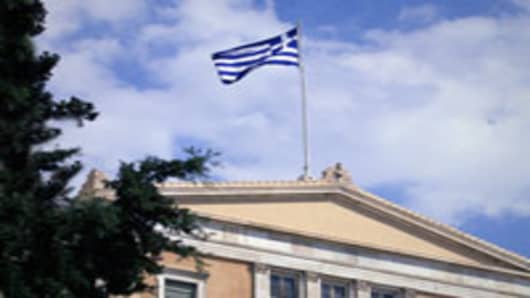Eurozone leaders have given themselves three weeks to finalize an overhaul of Greece's bailout program, requiring parliamentary backing in creditor countries that are skeptical about reducing Athens' interest rate burden.
But eurozone approval, which officials hope will be completed in time to release a long-delayed €31.3 bn aid payment to Athens on November 27, will only be granted if the Greek parliament agrees to new austerity measures in a hotly-contested vote scheduled for Wednesday night.
"We have to back these measures, we are already committed to implementing them," Yannis Stournaras, Greek finance minister, said at a stormy parliamentary session on Tuesday. "They are tough but the alternative is a disorderly default."
(Read More: Spain Has Time, Greece Does Not: ECB's Nowotny)
The ruling coalition has employed emergency regulations to hasten passage of the 500-page legislative package, as it fears that a prolonged debate could trigger defections by government lawmakers.
Greek unions have called for another protest outside parliament on Wednesday, marking the second day of a 48-hour general strike.
If Athens wins the vote and passes a new 2013 budget on Sunday, eurozone finance ministers are expected to approve the interest rate cuts on Monday, starting a two-week clock for legislative approval in seven national capitals.
The interest rate cut is the most contentious part of a multi-pronged package being negotiated by the "troika" of international lenders to reduce Greece's burgeoning debt – projected to peak at 192 per cent of economic output in 2014 – and could prompt debates in some parliaments where support for more Greek aid is most tenuous. These include assemblies in Germany, Finland and the Netherlands.
Under the current €174 bn bailout program, Greece's interest rate is set at 150 basis points above interbank lending rates. Senior EU officials said they are considering cutting the premium to 80 basis points.
(Read More: Finance Ministers Meeting Unlikely to Decide Greece's Fate)
Greece's benchmark 10-year bond climbed the most in two months on Tuesday, to trade at 32.9 cents in the euro.
Eurozone officials are also close to a deal under which the European Central Bank would forsake profits on its Greek bonds, further reducing Athens' debt burden. Some hedge funds have snapped up Greek debt in recent months on expectation that the government could be given eurozone funds to retire some of its bonds.
Under one version of the plan, the ECB would be paid back in full by Athens but then pass the profits on to national finance ministries. The ministries, in turn, would return the cash to Greece.
Senior officials acknowledge the measures will not be enough to lower Greek debt to their target of 120 per cent of economic output by 2020, and are instead discussing moving the target to about 125 per cent by 2022.
Eurozone officials are focusing on debt relief after agreeing to fill a €13bn-€18 bn gap in the bailout by allowing Athens to issue larger amounts of short-term debt, most of which is purchased by Greek banks.
If eurozone governments are able to agree on the rate cuts, the ECB is expected to roll over the Greek bond redemptions it is owed on November 16.
— Additional reporting by Robin Wigglesworth in London.


